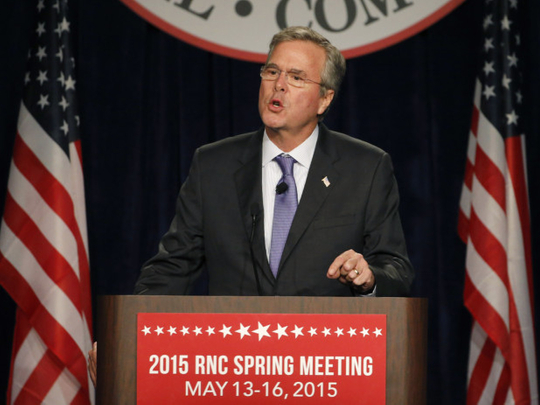
It is official. Jeb Bush now does not know whether he would have ordered the invasion of Iraq in 2003.
That is not what he said at first. Last Monday, when Fox News host Megyn Kelly asked him about this, the former Florida governor said: “I would have and so would have Hillary Clinton, just to remind everybody, and so would almost everybody that was confronted with the intelligence they got.”
But the very next day, the younger Bush clarified his answer. On Sean Hannity’s radio show, he said he had thought Kelly asked him what he would have done if he had had the same information that his brother had at the time (not what decision he now considers best, with hindsight). Jeb’s new answer: “I don’t know what that decision would have been.”
In fairness to Jeb, it sounds like he was trying to counter a popular argument about pre-war intelligence. Some Democrats contend that the claims of weapons of mass destruction (WMD) were cherry-picked and the result of political pressure. Jeb, however, was asserting what numerous bipartisan investigations have concluded: At least on the question of WMDs, the intelligence agencies in the US (not to mention Britain, Israel and elsewhere) were just wrong.
But the more interesting part of Jeb’s response came in how he explained the chaos that has engulfed Iraq with the rise of Daesh (the self-proclaimed Islamic State of Iraq and the Levant). He asserted the establishment Republican Party’s conventional wisdom on this: The surge of troops ordered by George W. Bush after 2007 worked, but then Barack Obama blew it by withdrawing from Iraq too early. “That security has been totally obliterated by the president’s pulling out too early, and now these voids are filled by this barbaric asymmetric threat that endangers the entire region and the entire world,” Jeb told Hannity.
Bush then made an odd point: “The best way to lessen the chance of having American boots on the ground is to have a foreign policy that is strong and secure and consistent.” It is easy to deduce what Jeb was getting at with that line. War and occupation are never the desired outcomes of US foreign policy. And yet there is a tension within the remarks. If more boots on the ground in Iraq was the key to securing Iraq, why wouldn’t boots on the ground be a component of a strong, secure and consistent foreign policy in 2015?
It is particularly relevant now. The next president will inherit Obama’s war against Daesh. The next president will have to make a decision about sending special operations forces back to Yemen. He or she will probably be waging war in Afghanistan as well. And we do not yet know what will come of the deteriorating security in Libya and Northern Africa.
Taking the view that strong foreign policy should preclude ground troops makes Jeb sound like Obama. He too has sought to avoid deploying ground troops. And this has gotten him into some trouble.
In the last year, Obama has waged an air war in Iraq, but has not authorised US special operations trainers to fight alongside the Iraqi military units they are training. As a result of this policy, the US has at times been an air force for Iranian-backed militias.
So how has Jeb differentiated himself from Obama’s foreign policy? He has been sCeptical of Obama’s Iran nuclear negotiations, calling them naive. But he has not said whether he would send US ground troops to Iraq, or whether he would allow the US troops already there to fight against Daesh. There is no doubt that coming out for more troops in Iraq would bring political risk. Americans these days are tired of trying to rebuild Iraq and its army. But Jeb is also taking a risk by trying to have it both ways: Saying boots on the ground were key in 2007, but should not be the key in the future. He appears inconsistent at best and disingenuous at worst.
— Washington Post









